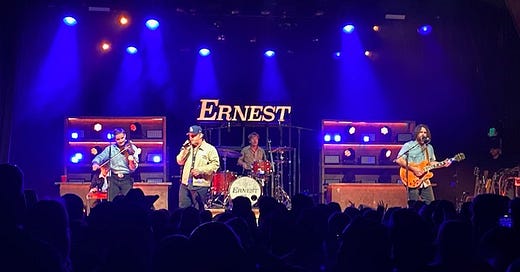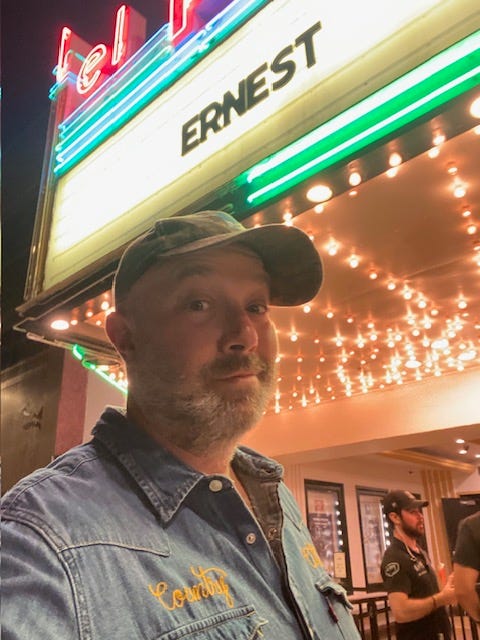In 2015, Keith Hill, radio consultant and eater of boring salads, spoke with industry pub Country Radio Aircheck and claimed that radio fans want to listen to more men on the radio, and therefore, radio programmers should limit women’s air time and never play songs by women back-to-back.
In a less-than-obvious choice of analogies, Hill suggested that a radio station’s program is like building a salad, where men are the lettuce and women serve as the tomato garnish.
For a complete outline of this “lettucrous” argument, please read Marissa Moss’ Her Country.1 One particularly nuanced counterpoint came from Margo Price, who printed shirts that said, “You Say Tomato, I Say Fuck You.”
Unfortunately, not much has changed in the past nine years, and my experience at the recent ERNEST concert at the El Rey was the perfect example of the lack of progress.
This kind of show isn’t often my cup of tea, but ERNEST surprised me. His newer music lands closer to traditional country and the lyrics of his songs seem clever. It’s not what I’d listen to daily, but I don’t turn off his music when it’s on Country Radio.™
The same cannot be said for his opener, Graham Barham.
His music, performance and banter were nothing special at best. He served as BroCountry, Inc.’s representation at the event, perhaps as a Morgan Wallen facsimile. 2But much like a copy of a copy, the secondary product isn’t that good. And when the source material is mass-produced, lowest-common-denominator swill, the quality of the copy isn’t assured.
To borrow Hill’s questionable analogy, Barham is like week-old Trader Joe’s bagged arugula — pieces of it are salvageable, but do you really want to get your hands slimy for a couple of bites of greens?
Barham had a few clever hooks, but that doesn’t warrant his inclusion on a bill with someone at ERNEST’s level.
There are countless women in this space, even as associates of BroCountry, Inc., who would have been so much better.
Priscilla Block, Alana Springsteen and Mackenzie Porter — each have millions of monthly listeners on Spotify, songs about trucks, whiskey and bars and, upon closer listen, that trademarked BroCountry, Inc. sound.
Adding these artists or someone similar wouldn’t force this audience to consider a more robust definition of country music. But the industry could ask more of the audience.
Nikki Lane would provide a harder-rock-fueled middle finger that would suit these fans. The Castellows would be an incredible addition with a slightly more traditional bent — while still playing by the rules of small towns and back roads. Reyna Roberts could easily be an associate of BroCountry, Inc. if management were willing to invest in its future.
And countless alt-country stars shine bright in East Nashville, Austin, LA, Chicago and beyond who could do wonders as an opening act. With Post Malone’s advocacy for Sierra Ferrell, this market may be ready for someone beyond Music Row.
But this isn’t about forcing folks to listen to what I like more — it’s about increasing the addressable market and selling more tickets. Except for Ferrell, each of these women and women-led groups play a similar or adjacent style of country music to ERNEST. Each would draw a different market segment and increase merch and higher-end drinks sales.3
People want tomatoes, pepper, red onions and cheese in their salads — and are willing to pay for it.
Providing the same soggy lettuce with ranch dressing over and over does nothing to advance the music or enhance the marketability of the genre and, in the end, limits the profitability of the labels and the more prominent artists.
Post Malone figured it out. Zach Bryan figured it out. Perhaps Music Row could take off its camo cap, crunch some numbers and deliver a better product. A product that is more representative of its consumer base and the potential market it could reach.
Not to mention, it’s the right thing to do.
I will not apologize for this joke. I stand by it.
The Oxford Language definition of BroCountry, is a style of country music influenced by hip-hop, rock, and R & B, and featuring male vocalists singing lyrics celebrating themes such as drinking, women, and pickup trucks. Critic Jody Rosen first used the term in a New York magazine article in 2013.
Recent market research suggests that the surge in ready-to-drink (RTD) cocktails and the continued popularity of hard seltzers is driven by women — while not by huge margins, the markup available to an RTD cocktail vs. a beer is significant. In short, beer continues to lose market share year-over-year due to lower-cost, higher-priced items favored by women. Source on overall trends and one on the RTD segment.








Wonderful read!!
Preach!